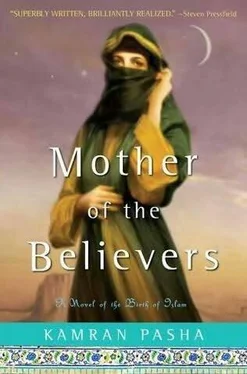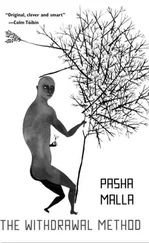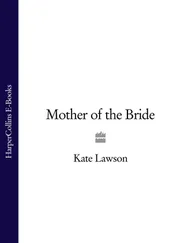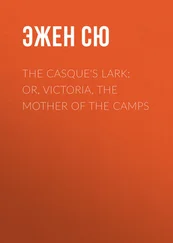The caravan, with its riches of gold and spices from Jerusalem and Damascus, had been a ruse to bring us out of our homes onto the battlefield. Abu Sufyan had followed Hind’s carefully crafted strategy to the letter. Instead of passing by the black hills of Medina along the normal trading route, he had ordered the caravan to follow the coastal road along the great sea that separated Arabia from Egypt and Abyssinia.
And even as the Messenger ordered a small party of three hundred men to lie in wait for the caravan at the outskirts of Medina, an army of a thousand heavily armed Meccans was marching north to trap us.
We would meet our destiny on a rocky strip of land to the southwest called Badr. It was a regular stopping point for traders headed toward Yemen, as it contained reliable wells of clean water that could replenish a caravan’s most precious resource. The Messenger set out with his raiding party, which was equipped for only a minor skirmish and was woefully unprepared for what was awaiting us. We were accompanied by a train of seventy camels and three horses, and I rode behind my husband on his favorite red she-camel named Qaswa. Though it may have surprised the sheltered ladies of Byzantium and Persia, used to hiding behind perfumed walls while their men risked their lives, Arab women regularly accompanied our warriors to inspire them and remind them what they were fighting for. It was a tradition that the Messenger respected, and as a result, I would be witness to many battles over the years to come. It was perhaps this comfortable familiarity with the heart of warfare that would cause me to overreach on that day of infamy that was still decades away.
We rode through the northeast mountain pass until we entered the valley of Badr. It was almost completely surrounded by hills and there were only three gateways into or out of the watering hole-the route we had come upon, a pass leading northwest toward the Syrian road where we expected the caravan, and a southern track that faced Mecca. The valley itself was surprisingly cheerful, with verdant foliage watered by the rich collection of wells. The Messenger pitched camp near the Medina road and the men set up a cistern with which they could more easily access the well waters. A small command station was established by placing several poles made of palm trunks in a circle and then covering the top with a black canvas to shield it from the cruel sun. Here the Prophet held strategic meetings with his generals, while I looked to the north, my heart racing with the nervous anticipation that is the breath of a battlefield.
We were elated. The wells had fallen to us with ease and the caravan would follow suit soon. And then word came from a pair of sentries we had sent to check on the caravan’s progress that Abu Sufyan had diverted his train, and excitement turned to frustration. The Messenger had been prepared to pack up the camp and return home, when the steady roll of drums echoed from the south.
The trap had been sprung and Mecca’s armies were at our doorstep.
Soon the southern pass was swarming with warriors in glittering mail, waving defiant flags of red and blue. Their cries of challenge and their mockery of our puny force echoed across the valley and a terrible dread fell upon our camp.
I sat beside the Prophet, who had retired to the command station at first sight of the Meccan expedition. He knelt on the ground in quiet prayer, his eyes closed and his brow furrowed as he attempted to contact the angels and find some guidance. My father stood behind, a heavy broadsword in his hand, ready to defend the Messenger should the Meccans break through the line of defense that was even now forming around the command post.
As I shaded my eyes from the blazing sunlight, I looked down at the advancing Meccan army and my heart fell. We were heavily outnumbered, although the haze that covered the southern passage made it difficult to determine the true numbers of our adversaries. I guessed that Mecca had a two-to-one advantage (I would later learn that it was three to one) and the odds of victory against this numerically superior and better-armed foe were not worth calculating.
A sad thought crossed my mind. After everything I had been through in my young life, at only eleven years of age it might all come to an end right here, before the sun went down. Though even the pagans did not condone killing women and children (I was both), I could smell the bloodlust from across the valley-feral, animal, unthinking. When the fire of war was ignited in men’s hearts, women and children could and would die, as they always had throughout history, and I had no guarantee of clemency. Then again, perhaps death beside my husband and my father would be preferable to what would be done to me if I were captured and taken back to Mecca as a slave.
And then I heard a shout from the enemy lines. I looked across the valley and saw three men step away from the Meccan forces and walk fearlessly into the rocky plain between camps. I recognized them immediately as three of the most prominent leaders of Mecca. Utbah, the father of Hind, led his brother Shaybah and his son Waleed, their swords sparkling under the glare of the cloudless sky. This was an ancient ritual of warfare that I had heard about but never witnessed with my own eyes. Before the Arab tribes fought, they always sent their most feared warriors to face each other in a duel of honor. And the Meccans had sent Utbah, whose yellow-green eyes were so much like his daughter’s that I wondered if Hind herself had come disguised as a man.
As Utbah approached the middle ground between armies, he looked over the rows of Muslim men, wearing old leather armor and carrying rusty blades and spears, and laughed. He spit at the ground before him, as if challenging men of this lowly caliber were an insult to his honor. And then I saw his eyes fall on a young man who stood by Hamza at the front line and Utbah’s sneer twisted into a gape of shock.
And then I realized that the thin and tall youth he gazed at was Abu Huzayfa-his son. Like Abu Sufyan’s daughter Ramla, Utbah’s son Abu Huzayfa had defected to the Muslims, adding to the enmity between Muhammad and the tribal chiefs, who accused him of seducing their children with sorcery. I saw the troubled look on my husband’s face as he saw father and son stare at each from across the battle lines, and I realized that the Messenger would never have allowed Abu Huzayfa to come with the raiding party had he known this would be the outcome.
But then Utbah regained his composure, a mask of iron covering his raging emotions. He waved his sword defiantly and issued the ancient words of challenge.
“Muhammad! Here stand the lions of Quraysh,” Utbah said. “Send forth worthy men to face us-or surrender in shame.”
To my horror, I saw Abu Huzayfa unsheathe his sword and move forward, ready to duel his own father to the death. And then Hamza caught the stern look on my husband’s face and he put a restraining arm on the boy’s shoulder.
“No. Not you.”
Abu Huzayfa stepped back and his own mask of defiance fell, and I saw in his eyes terrible grief.
And then I felt a rustle of movement beside me as the Prophet rose and chose the champions who would defend the Muslims. He gazed at the eager faces of his warriors, and then made a decision that I knew was tearing his heart in two. The best men to face Utbah’s challenge were those who shared his own blood. He pointed to three of his most beloved family members-his cousin Ubayda ibn Harith, his uncle Hamza, and Ali, the boy he treated like a son. I felt tears burning my eyes. I could not imagine how hard it was to send the people he loved the most to face the possibility of death before his very eyes.
The three chosen ones of the Ahl-al-Bayt, the House of the Prophet, stepped forward proudly onto the field, facing their opponents. Hamza had tossed aside his bow for a broadsword, and Ubayda held aloft a saber with a jewel-encrusted hilt that shimmered in his hands.
Читать дальше












